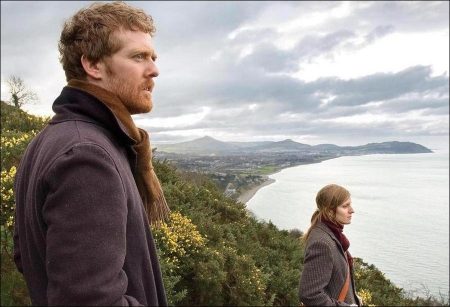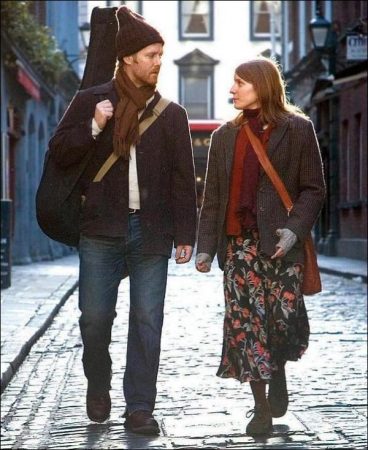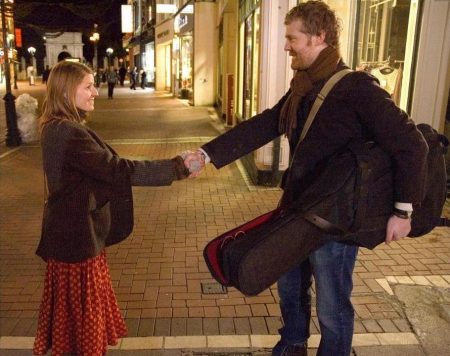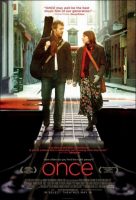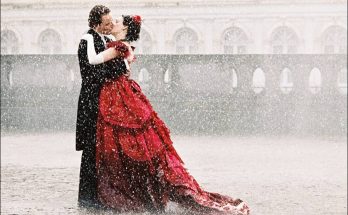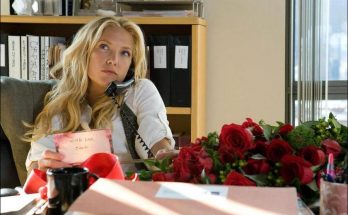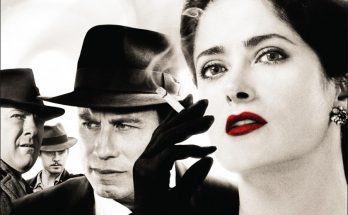Tagline: How often do you find the right person?
The Guy works part-time helping his father, who runs a small, vacuum cleaner repair business, but dreams of having his songs recorded and landing a record deal. His girlfriend has recently left him and gone to London, and he is still coming to grips with that loss and is emotionally vulnerable.
One day while busking on Dublin’s Grafton Street, he meets the Girl, an East European immigrant who has moved to Dublin to start a new life for herself and currently works as a house cleaner in an upper-class residence. She is struggling financially, and cannot afford the piano she yearns for, and is also in the process of making crucial decisions about her personal life. In a Dublin that has grown increasingly affluent and materialistic during Ireland’s unprecedented economic boom, they are both outsiders, struggling with their art and their hearts. Through music, they find a common bond that brings them effortlessly together.
As the Guy and the Girl get to know each other over the course of an intense few days, their relationship blossoms as they share their music, put together a band to rehearse songs and record some demos, all of which results in them bringing some much-needed impetus to their artistic and personal lives.
Sundance Film Festival World Cinema Audience Award winner “Once” is the story of the Guy (Glen Hansard), who works part-time helping his father run a small, vacuum cleaner repair business, but dreams of one day having his songs recorded and landing a record deal. Emotionally vulnerable, he is still coming to terms with the recent departure of his girlfriend and lacks the conviction and passion to move on in his pedestrian life.
One day while busking on Dublin’s trendy Grafton Street, he meets the Girl (Marketa Irglova), an Eastern European immigrant who has moved to Dublin to start a new life for herself. Currently working as a house cleaner in an upper-class residence, she is struggling financially. She yearns for what she cannot afford – the piano that helps her escape from the daily grind of finding her way through this strange new land. She too is in the process of making crucial decisions about the upheaval in her personal life.
As the Guy and the Girl lives begin to intertwine over the course of an intense few days, their relationship blossoms as they share their music, create songs, forge a band and record a demo album. Through this merging of talents, it brings them both the much needed impetus and direction to their artistic and personal lives. Their shared love of music causes them to flourish and grow with a new found confidence as they take a chance on each other and a new beginning on life.
About the Production
ONCE is the inspirational tale of two kindred spirits who find each other on the bustling streets of Dublin. One is a street musician who lacks the confidence to perform his own songs. The other is a young mother trying to find her way in a strange new town. As their lives intertwine, they discover each other’s talents and push one another to realize what each had only dreamt about before. ONCE is their inspiring story.
Written and directed by John Carney (On the Edge, Bachelors Walk), ONCE is a nod to the classic musicals of the past, while it is also grounded in the bohemian world of struggling young Dubliners that he knew from his days as a young musician. In the early 1990’s, before devoting himself to a film career, Carney was a musician playing bass guitar with Dublin band The Frames. He understands and appreciates the power of a song, and how it can carry more weight than swathes of dialogue. In fact, conversations about this project started in 2005 at a Frames’ concert. “As a filmmaker with a background in music, I wanted to try and make something that relied less on your conventional 90 page script, something that was a little bit more organic, and something that included a lot of songs. That was the original starting-point,” he explains.
As he developed the concept that would become ONCE, he sought “something that would express itself in ten pages of dialogue or script. A two-and-a-half-three-minute piece of music, I always feel, can be as powerful as a day’s conversation with, for example, a young lady. You can talk and talk and talk…”
However, Carney did not want ONCE to be a classic song-and-dance musical where scenes ended with the key characters breaking into verse. As he recalls, the fleshing-out of the characters became a part of his early morning routine.
“It originated with just me sitting outside, having my breakfast, coffee and cigarette every morning, playing songs and thinking for months and months, how could I make a little film that has all these songs in it,” he explains. “I came up with the idea of a story of a busker mainly because I wanted to keep the characters in a musical world. I didn’t want them just singing, I wanted them to be musicians and singers. So it was more natural that they would sometimes say to each other, ‘Look, I’ve just written you a song and I want you to hear it.’ It would be natural for them to sing. So I came up with the idea of a busker and a pianist, who then ended up being an immigrant.” The music in the film would not work if it wasn’t incorporated in to who they were.
The story is set in Carney’s native Dublin, with Frames’ singer Glen Hansard as a songwriting guitarist, and Marketa Irglova – a musician from the Czech Republic who has collaborated with Hansard – as an immigrant pianist. Despite Carney’s background as a former member of The Frames, he hadn’t initially considered either Hansard or Irglova for the key roles, even though he had Hansard contributing songs from the beginning.
“I had an Irish actor in mind for the leading role of the film, who can sing as well, but it didn’t work out for him. And it just gradually occurred to me as I was putting [Glen] on tape, asking him about his songs, giving him script pages. He’d go off and write something according to them, or I’d write some scenes according to the song he gave me. This guy’s the guy to do this role, really. Because he’ll sell these songs better than any actor would as they’re his songs.”
Hansard also had some previous acting experience, having played the part of Outspan in Alan Parker’s film of the Roddy Doyle novel, The Commitments. But while Carney acknowledges that aspect of Glen Hansard’s past, he insists that The Frames’ front man had even more to bring to the role.
“Glen has a little bit of acting experience but, more importantly, he’s just a very naturally charismatic guy: he’s very laidback, he doesn’t try too hard,” he insists. “And the great thing about Glen is that he’s not an actor, so he doesn’t actually care, in a way. Sometimes, working with professional actors, you realize you’re just helping them put their show-reel together. A professional actor can rarely get behind a production in the way a non-actor will, which is understandable. I like working with non actors because they’ll give you their all.”
For Marketa Irglova, then only 17, the concept of acting was alien, although she had been aware of the project and was enthused by it. “I heard about the idea of the film from Glen, because he was asked to write music for it,” she recalls. “I saw some of John’s films before and I thought that was very cool. The idea of the film sounded nice, and then one night I got a phone call from Glen, asking if I’d like to act in the film. I thought he was joking! But he was serious, saying that John was considering casting me in the film, that he wanted me to audition for it.
“I thought it was really crazy as, obviously, I haven’t done any acting. Because I’m so young, I’m kind of up for anything,” she laughs. “I didn’t really take it so seriously. I thought: ‘Ah yeah, they tell you that you might be in a film and then they just don’t cast you, they take someone else.’ So I didn’t put too much hope in it, but the idea was very exciting. Part of the reason I was so excited was because Glen’s music would be in it, and I love Glen’s music. So I did the audition, I played some piano music for John, I read a bit of script, and that was it.”
At that stage, Carney felt very comfortable with the people around and involved with the film. As well as having Glen and Marketa on board, the crew were people whom he’d befriended while also having utmost faith in their abilities.
“They were all people that I knew and trusted,” he explains. “They got the whole idea of this not being your conventional film. So once my mates were making this film with me, then I was like: ‘Brilliant!’ This is back to how we were when we were 16, with a camcorder and friends and some songs. And I think people who’ve seen the film have responded very warmly to that, because they’ve seen that nobody’s trying to sell them anything here. That’s the vibe.”
Quite often, getting a film produced can prove to be a daunting exercise. But in the case of ONCE, John Carney’s experience was quite the opposite. For one thing, he was on familiar territory. “I’ve known Samson Films for years,” he explains. “So when I had the idea of the film, I was thinking of various ways of producing it, and when I decided that I wasn’t going to go with a big actor in the lead role – or any actor – I went to Samson and said I have this idea for a film, and it’s kind of scripted and these songs are written, do you guys want to get on board with it? And they did.”
“We had a great relationship — myself, the producer Martina Niland and executive producer David Collins. We just had a very relaxed relationship producing this film, because it was made for a small amount of money and everybody pulled in and joined together for this short period of time to make it work. Samson is a good company for that, because David Collins is at a place in his life where he does not need to prove himself as a producer; he just wants to make what he wants to make. And this appealed to him, and I think working with me again – because we had done a film a few years ago, and also he was one of the executive producers on BACHELORS WALK – meant we had a good relationship, and I wanted to work with producers that I didn’t have to explain everything to.”
Martina agrees adding that “It was a real back-to-basics form of filmmaking and certainly the kind that has always attracted me the most and got me excited about ONCE from the early days of chatting to John about his ambitions for the project. We avoided bureaucracy and red tape as much as possible and everyone got to concentrate 100 percent on what’s on the screen. I think that shows when one watches this film.”
The backdrop largely consists of Dublin city streets, shops and the less-than-salubrious interiors of the main characters’ homes; neither has their own place, with the Guy having moved back in with his father following his mother’s death, while the girl lives with her non-Englishspeaking mother, and her young child. Gradually, their two worlds cross over, through their shared love of music.
With Glen Hansard and Marketa Irglova sharing most of the screen time, their characters form an artistic bond and, as a result, they fall in love. And although neither are actors, both Hansard and Irglova carried off their roles with an impressive naturalness and warmth. “They have a good relationship, so that really helped,” says Carney. “I love the benefit of having the actors know each other. It certainly taught me to get actors to hang out with each other before going into a certain style of film making. That was the good thing about Bachelors Walk; by Series Three the guys were three mates. They just do it – there was none of the ‘finding it’ that you had to do in the first series.”
Irglova impressed with her performances throughout the shoot and, as Hansard puts it, “she didn’t have any problems, slipped straight into it and really got it.”
ONCE was shot very quickly over the course of a couple of weeks. “It was super-fast,” recalls Glen Hansard, who insists that he’d never swap his life as a musician for a career in front of cameras. “I’d experienced a little bit of this from The Commintments, as in getting up early and working throughout the day, but I don’t remember being as exhausted at the end of every day,” he recalls.
“We were up at six every morning, we were working all day, and it drains the life out of you. Being in a band is so much easier. You get up at midday, you head to the airport, you get on a plane, you get to another country, you sound check around five or six, doors are at eight, you’ve got your gig at nine. It’s very chilled-out. It’s all evening work. With this, we were just knackered, going back home and literally being a shell of yourself. You were just completely gone until the next morning. It was very intense.”
It was a similar experience for Marketa Irglova, who admits that she has “mixed feelings” about the shoot “because it was really exhausting. If you woke up and had some problems in your personal life, you had to be up for the scenes you were shooting and you had to be convincing, because being an actor is being a good liar. You have to convince everybody that you’re feeling everything that you’re supposed to be feeling, which is really hard, and really demanding of your emotions. We had really tough days; it was nothing like when you play music.”
Ultimately, though, she found the experience very fulfilling. “I really enjoyed being a part of a team. It was very compact. John, Glen and I were at the center, but there were other people around it that took care of their own parts and I really enjoyed working with everybody, meeting new people, and watching the film afterwards, and this feeling of achievement of doing good art; looking at it afterwards and feeling we did something good here.”
The songs are, obviously, an essential element of ONCE. The fact that Glen Hansard and Marketa Irglova ultimately played the parts of the Guy and the Girl could only add layers of emotion, not just to their roles, but especially to the songs they had recorded together.
John Carney describes Hansard as “a good lyricist because his songs are never literal. His songs are very much about pictures and images and ideas, and moments in time. They’re quite vague, in a very good way that good songs are. And they’re also very open to interpretation, they’re like a good poem, which is meaningless one day and then suddenly has real meaning when you’ve been there, or when you’ve had that experience. He paints little pictures with the songs. I’d write a scene, or come up with a character note based on a song.
“Then, occasionally, it would be the opposite situation where I would ask Glen to write, not a tailor-made song, but I would give him some ideas about a scene and he would come back to me with a song. A lot of the material that Glen brought in, he had already written. They’re not tailor-made songs for the film. Nor is the film tailor-made around a bunch of songs; but they meet somewhere in the middle, and I like that idea.”
What also appealed to Carney about this project was the fact that it allowed him and Hansard to combine their talents and interest in each other’s craft. “I left The Frames to make films,” he recalls. “But Glen was always very interested in films, we always had a lot to talk about, about movies. He was doing The Commintments just as the band started. But apart from that, Glen was always interested in Bergman films and French films. He’s certainly a film fan, and an independent or arthouse film fan as well.”
And despite taking different paths, the two remained friends and would discuss the possibilities of working together. “Occasionally our paths would cross and we always had a quick chat about doing something collaboratively, whether it would be that I’d make a rock video for them, or that he’ll write a song,” Carney recalls. “And I used his songs in a couple of other films that I’d made, but it was never quite satisfying enough, so this was a great opportunity to really work together.
“Glen loves films, but he’s not a filmmaker. He’s a very visual guy, he does a lot of artwork for their albums. And I’d be the same, in reverse. I’d spend half my day at the computer screen writing a script, then I’d go off and play the piano, for no reason other than it entertains me. I don’t do it professionally, but it means a lot to me. I love music. It was never a career for me, really, apart from when I was young and in the band. It’s an entertainment thing. For Glen, film is an entertainment. So it was interesting, the two things coming together. That was a good experience we both, I think, responded well to that.”
Glen Hansard sees ONCE as a source of much pride as well as an exceptional experience. “It’s definitely a lovely thing for me to look back and say that I was involved. It basically came up trumps as far as I’m concerned. I can look back and be proud of it, and not only for the fact that we managed to act our way through it, but also that the songs are there and they’re kind of immortalized in this film. Which is great.”
Carney reflects on ONCE with a lot of personal satisfaction. “Experience is good; it’s easy to get people to have confidence in you when you have a bit of experience,” he says, looking back on the production. “Also I was at a particular stage in my career. I was a filmmaker for a while and then I got sucked into TV. So when I came back to filmmaking I’d lost a hold in the ladder slightly, and I was finding it hard to get a film made. Making ONCE wasn’t a career move, so much, it was just a decision to go back to basics, and prove myself again.”
Once (2007)
Directed by: John Carney
Starring: Glen Hansard, Marketa Irglova, Hugh Walsh, Gerard Hendrick, Alaistair Foley, Marcella Plunkett, Danuse Ktrestova, Krzysztos Tlotka, Tomek Glowacki
Screenplay by: John Carney
Production Design by: Tamara Conboy
Cinematography by: Tim Fleming
Film Editing by: Paul Mullen
Costume Design by: Tiziana Corvisieri
Art Direction by: Riad Karin
Music by: Glen Hansard, Markéta Irglová
MPAA Rating: R for language.
Distributed by: Fox Searchlight Pictures
Release Date: May 16, 2007
Visits: 67
